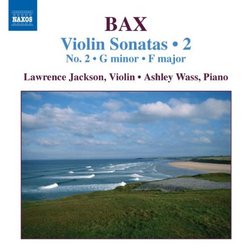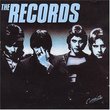| All Artists: Arnold Bax, Ashley Wass Title: Arnold Bax: Violin Sonatas, Vol. 2 Members Wishing: 0 Total Copies: 0 Label: Naxos Original Release Date: 1/1/2007 Re-Release Date: 11/20/2007 Genre: Classical Styles: Chamber Music, Historical Periods, Classical (c.1770-1830), Instruments, Strings Number of Discs: 1 SwapaCD Credits: 1 UPC: 747313009473 |
Search - Arnold Bax, Ashley Wass :: Arnold Bax: Violin Sonatas, Vol. 2
CD DetailsSimilar CDs
|
CD ReviewsEnthralling David Saemann | 04/28/2009 (5 out of 5 stars) "I was so taken by these artists' first volume of the Bax Violin Sonatas that I purchased this second volume right away. I remembered enjoying Bax's Violin Concerto with Lydia Mordkovitch some years ago, so I was eager to hear more of Bax's writing for violin. The contents of this disc are very fine. Laurence Jackson is the leader of the City of Birmingham Symphony Orchestra, former first violin of the Maggini Quartet, and, on the basis of this album, a distinguished soloist. Ashley Wass is well known from his Naxos CDs. The Second Violin Sonata is a wistful work with some reaction to the Great War, especially in the second movement, in which the violin is muted throughout. The Legend and the Ballad are shorter works from around the same time as the Sonata. They are vigorous workouts for the violinist, and would make great recital encores. A real surprise is the 17 year old Bax's one movement Sonata, a work of precocious lyrical and architectural stature. Finally, there is Bax's last Violin Sonata, written in 1928 and suppressed by the composer when he rescored it for his Nonet. It was premiered in 1983, the year of the Bax centennary, and is certainly an interesting, if somewhat cryptic piece. Throughout the CD, the soloists display great enthusiasm, and the sound engineering captures them in the marvelous acoustic of Potton Hall. For someone like me who finds Bax's Symphonies a tough slog, discovering his Violin Sonatas has been a true revelation." State-of-the-art performances Chris C. Hill | 05/23/2010 (5 out of 5 stars) "Bax's second violin sonata is one of the most nuanced, subtly inflected duos ever written, requiring everything from gutsy, sweeping gestures to ethereal harmonics, all couched in a richly chromatic idiom that pushed tonality in new directions. Those who know Bax's "November Woods" will recognize the close kinship of this sonata with the seminal orchestral work. Jackson has the measure of this music and plays it all with a stunning tonal palette, ably matched by Wass. Reproduced on a good system and with proper volume levels, there is nothing reticent in this bold performance.
The unnumbered fourth sonata contains some of Bax's best chamber music. Though I prefer it in its recast form as a nonet, with performances this good it carries the day as a violin sonata. Good as it is, if you want to hear mature Bax at white heat and also exceptionally cogent, try his third violin sonata, performed by the same forces. With any fine music the more a listener brings to it, the more the music gives back. Still, with many pieces I find there's a 'saturation point' beyond which further listening feels familiar rather than adventurous. Bax is an extremely generous composer, and works like these violin pieces can, in my experience, bear unusual numbers of listenings without reaching a saturation point. Highly recommended." |



